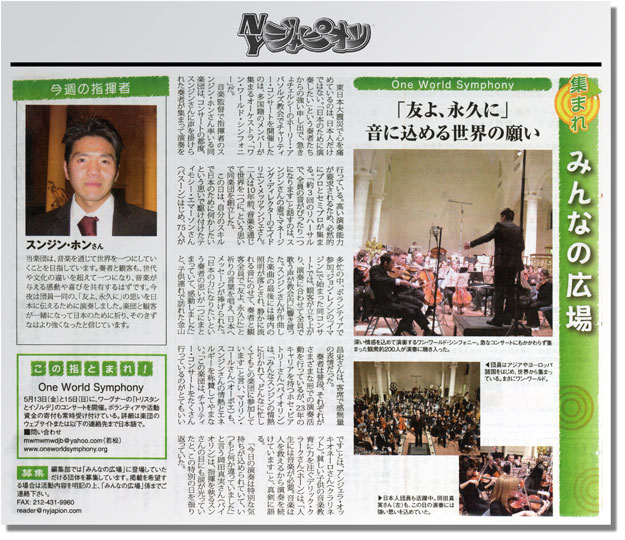April 2011
NY Japion features One World Symphony’s Concert for Japan

Sung Jin Hong’s Interview with NY Japion’s Yuko Kimoto
NY Japion, a weekly Japanese newspaper, featured One World Symphony’s Concert for Japan in their April 15th issue. The concert, held on April 3rd, 2011, benefitted the American Red Cross Japan Earthquake and Pacific Tsunami Fund. An emotionally engaged audience enjoyed the final movement from Mahler’s Third Symphony, Messiaen’s Quartet for the End of Time, an audience sing-along of John Lennon’s Imagine, and Sung Jin Hong’s Eye of the Storm specially revised to pay tribute to our brothers and sisters across the Pacific. Members from One World Symphony, including Artistic Director and Conductor Sung Jin Hong were interviewed for the feature.
NY Japion: What is One World Symphony’s mission and purpose?
Sung Jin Hong: One World Symphony’s general mission is to connect with the world through music. Whether it’s making sure local children can enjoy a concert of classical music, performing works by living composers from around the globe, or raising money for the best of causes, we want to touch everyone. But none of that matters if we don’t touch the intangibles. It’s hard to describe exactly what that means — we want to nurture passion through our performances. We want to inspire.
One World Symphony brings together a diverse community of artists and audiences through the common language of inspiring music-making. We use music to break cultural, generational, and social barriers. Music which touches the heart forms a bridge of understanding, and encourages tolerance, acceptance of our differences, and recognition of what we share.
This is one of the reasons why so many of our musicians and audience members remain at the performance space significantly after the final chord has been played. Our musicians are beaming with pride and appreciation for our attentive audiences, and the audiences are sharing the joy created by the power of the music which the artists have made. It’s deliberately interactive, because interaction creates a connection, and when you foster that connection, you’ve made a community.
NY Japion: What is your personal goal?
Sung Jin Hong: Personal goals change or transform. In a sense, my goal is to fulfill my potential while helping and empowering others and serving our community. Discovering one’s path is one of the greatest gifts, and I am very grateful. Above all, the most important thing in life is family. I may be too focused on a project sometimes, but I wouldn’t be where I am or who I am today if it wasn’t for every single person in my family. I am immensely grateful to my generous parents, sister, our One World Symphony family and friends, and my beautiful wife Adrienne.
NY Japion: Thank you for your chant “Tomoyo-Towani” to Japan. How did you feel when you were performing yesterday?
Sung Jin Hong: My composition Eye of the Storm for symphony orchestra and audience was first conceived when I returned to my homeland Korea for the first time in almost 25 years. The final section included a chant (prayer) from the audience while the symphony plays. The audience chants: “Goong-hah-myun Tohng-hahn-dah” repeatedly. It means:
|
궁하면 통한다: If you are in a desperate spot (궁하다), a path will open up (통하다). When you are desperate, then you will see a way. |
It was first performed by One World Symphony and its audiences in September 2010. To dedicate this performance to our brothers and sisters of Japan, I decided to revise Eye of the Storm and substitute a Japanese saying, instead of the original Korean proverb. I asked one of our violinists, Katsumi Ferguson, if she could please recommend a Japanese prayer or chant that has six syllables to match the rhythmic motive. She suggested “Tomoyo Tawani.” Even though I may not frequently pray these days, I do believe in the healing power of prayer. Having our symphony and our audiences chanting, meditating, praying through the words of “Tomoyo Tawani” may bring our musicians and audiences closer together and more importantly pray together for our brothers and sisters in Japan. Prayers do not have a “carrier” like internet connection or satellite wave. So in passing a prayer to someone, its strength is not affected by time and space.
NY Japion: Can you give some message to our readers?
Sung Jin Hong: On behalf of One World Symphony, our hearts and prayers go out to all the families of Japan.





